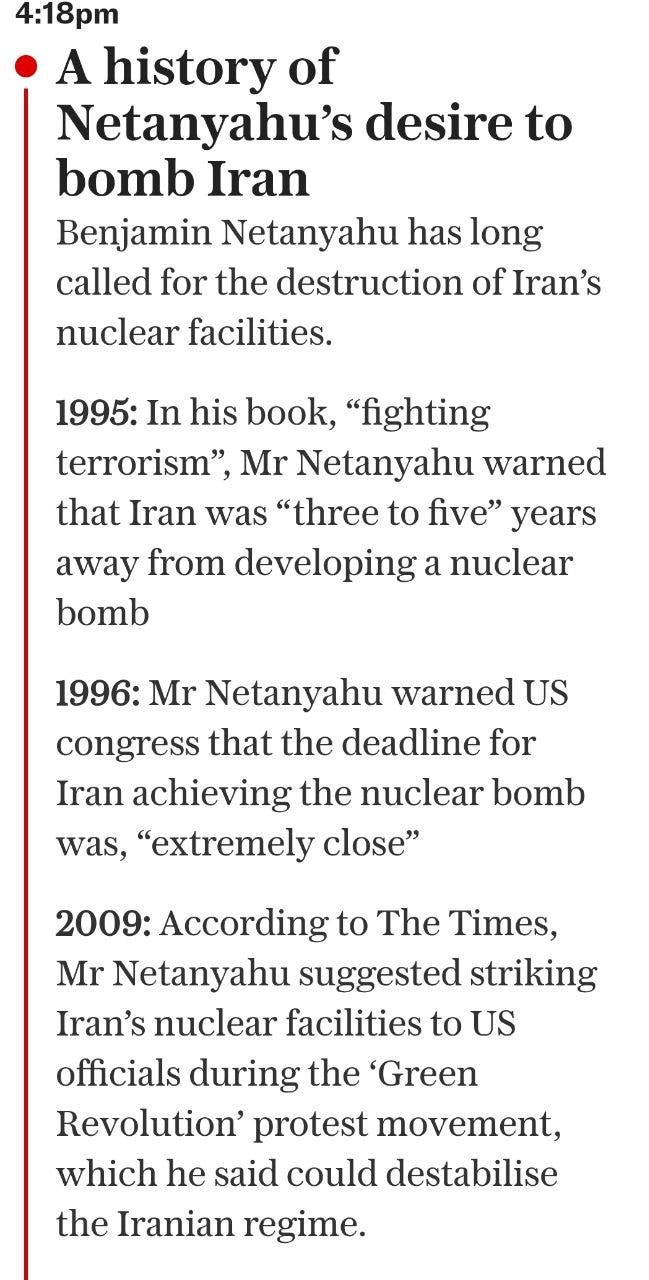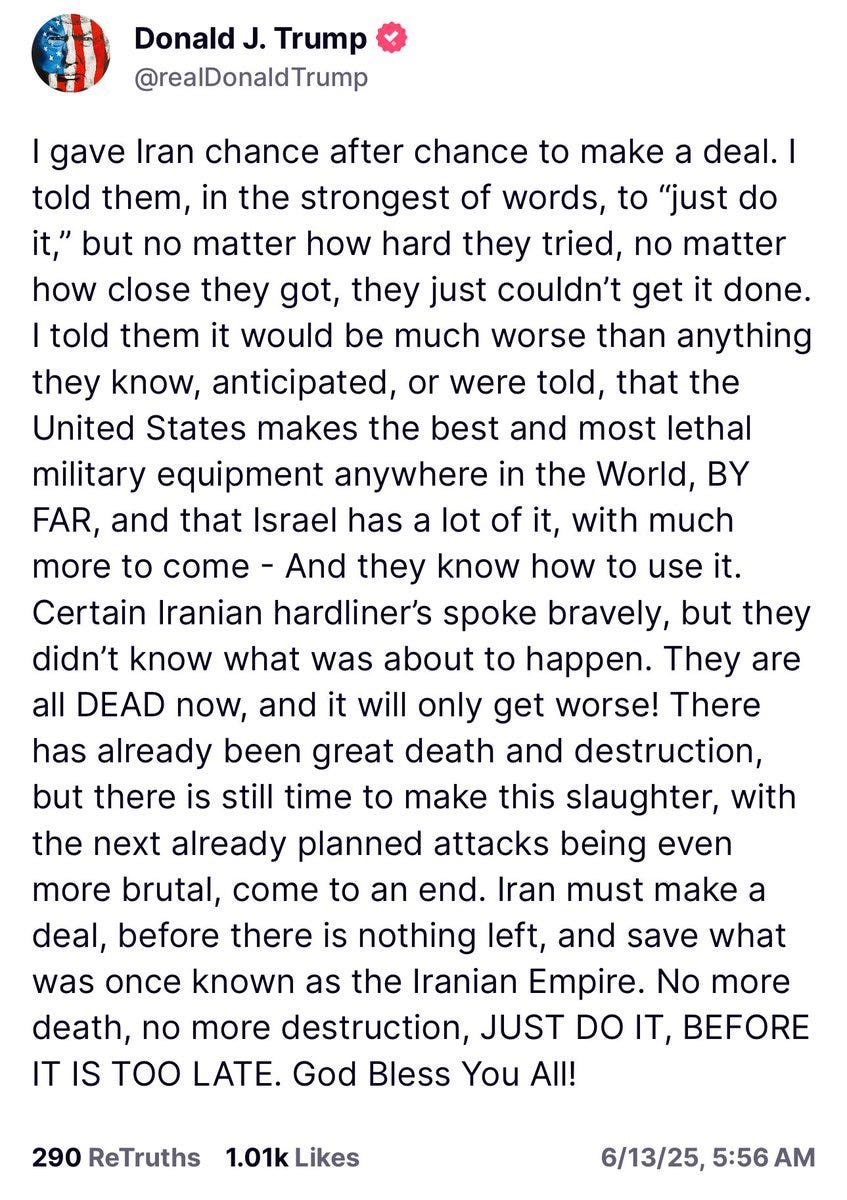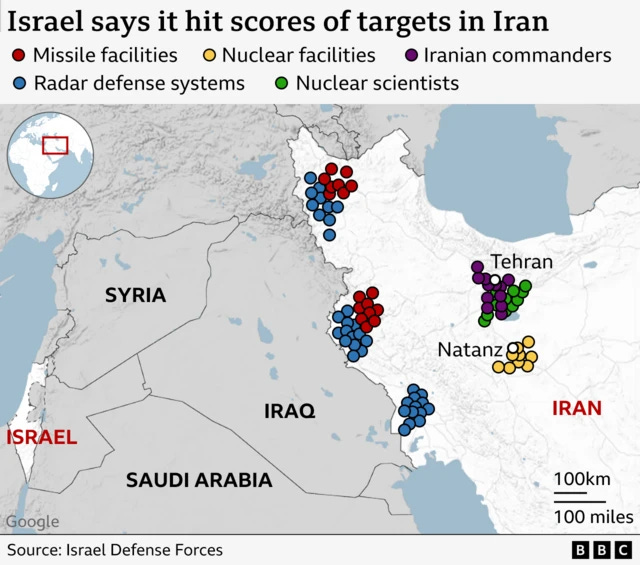Contents
Introduction
Israel Strikes Iran
Iran Responds
All Out War
Concluding Remarks
Other News In Geopolitics This Week
Bitesize Edition
Once again, we have seen escalating tensions in the Middle East over the last few days. This started on the night of June 12th, when Israel launched Operation Rising Lion. The first question to answer in light of this attack is, why now? The answer is multifaceted and is influenced by Netanyahu’s own personal political incentives and the current status of Iran’s nuclear industry.
With Israel’s attack, afterwards inevitably came an Iranian attack in response. This unfolded in multiple stages throughout the day on Friday the 13th. By the evening, Israel had once again launched more strikes against Iran in response. It was at this point that we saw the previous occurrences of de-escalation in April 2024 and October 2024 were not to be repeated this time.
Iran’s launch of Operation True Promise 3 made it clear that Israel and Iran are now in a state of all-out war. No war declarations will likely be made, but the actions are all that is necessary. What have been the key events of the last few days, and what damage has been done? I’ll explore this today.
Introduction
I was going to discuss economics and trade in the European Union today, but as often occurs here, the Middle East upends original plans. Today, we have to discuss the trading of missile attacks between Israel and Iran. What was involved in each attack, what was targeted, and why now?
On Thursday, I’ll discuss where we go from here, but before this, we need the background. Let’s dive in.
Israel Strikes Iran
This latest escalation started with Operation Rising Lion, undertaken by the Israelis on the night of June 12th. The reasoning behind this attack occurring now is multifaceted.
Firstly, this came in the aftermath of the IAEA ruling that Iran wasn’t sticking to nuclear obligations for the first time in 20 years. Iran also recently announced it would build and activate a third nuclear enrichment site in the country. At their currently existing uranium enrichment facilities in Natanz and Fordow, the Iranians have been digging tunnels under both. Iran also reportedly possesses advanced centrifuges, which could facilitate the increased enrichment of uranium.
The IAEA reported that Iran had enriched uranium to 60% purity, with the potential to make nine nuclear bombs if enriched to the 90% grade required. Israel stated Iran has enough material to make fifteen nuclear bombs in a matter of days. With this seen by Israel as a threat against its “very survival”, they thus launched Operation Rising Lion. In the aftermath of the attack, the IAEA reported no increase in radiation levels, and the chief has stated his readiness to travel to Iran to assess the situation. But while bombs are still flying, this is unlikely.
The initial strikes were directed at the following areas of Iran:
The IDF reported that this operation killed numerous Iranian military leaders:
Hossein Salami, Commander-in-Chief of the Islamic Revolutionary Guards (IRGC)
Gholamali Rashid, Command of Khatam-al Anbiya Central Headquarters
Mohammad Bagheri, Chief of Staff of Iran’s Armed Forces
Amir Ali Hajizadeh, Commander of Iran’s Air Force
Fereydoon Abbasi, Former Head of Iran’s Atomic Energy Organisation
Mohammad Mahdi Tehranchi, Nuclear Scientist
Abdulhamid Minouchehr, Head of Nuclear Engineering at Shahid Beheshti University
Ahmad Reza Zolfaghari, Nuclear Engineering Professor at Shahid Beheshti University
Amirhossein Feqhi, Nuclear Professor at Shahid Beheshti University
Since 1996, Israel and Netanyahu have said Iran is “90% done” on its progress towards a nuclear weapon. The IAEA ruling gave Netanyahu a reason to launch such an attack, with the IAEA stating they are unsure if Iran is using uranium for peaceful purposes only, and if they have declared all their supply.
However, Netanyahu was also incentivised to start a war with Iran on a personal political level. On June 11th, the Knesset undertook a vote to dissolve parliament.
Back in June 2024, a change in Israel’s Supreme Court stated that Ultra-Orthodox Jews could be eligible for compulsory military service. Prior to this, these men were exempt if they were studying Jewish holy books. With this conscription policy, Netanyahu was expected to lose these parties in his coalition, and so with a vote to dissolve parliament, his position as Prime Minister looked under threat.
With his personal political career hanging in the balance and the potential that he would have to face his personal corruption charges, he had to formulate a deal with these parties. But the far-right members of his coalition also wish for an aggressive policy of war against Iran. Thus, for Netanyahu’s individual power and control, and to maintain his coalition, the result was an all-out war with Iran. His fragile coalition remains together with exactly 61 votes, an exact majority in the 120-seat Knesset.
As a result of one man’s selfish desire for power, the wider world now watched on Friday as this conflict with Iran risked escalating rapidly.
This became a reality when we saw Iran respond.
Iran Responds
On the morning of Friday the 13th, Iran retaliated against Israel, launching 100 drones. After the drones in the morning came ballistic missiles in the afternoon. We then saw the US-Iran nuclear deal enter the picture as Trump took to Truth Social.
Trump stated he gave Iran “chance after chance”, but that they couldn’t get a deal done. The biggest roadblock here was the differences in nuclear enrichment. Trump wanted zero enrichment in Iran. However, a recent deal with Russia would have seen a plan to build 8 nuclear power plants within Iran, which would require at least some enrichment.
The Iranians are currently embroiled in an economic and energy crisis, and nuclear power would go a long way to addressing this. Albeit, nuclear power plants aren’t easy to build. The Chinese are some of the quickest at building functioning power plants, and they take over five years to build theirs. The chances of Iranian society dragging itself along for five years without another solution to its energy needs are slim. In fact, tensions are already heightened, as seen in 2022 with the protests and death of Mahsa Amini.

This seems to align with another reason why Israel launched this operation when it did. They are hoping that this internal instability could lead regime change.
Netanyahu called for Iranians to “rise up” and overthrow Tehran’s “evil and oppressive regime”. He also stated that Israel is on the side of the Iranian people. This pursuit of regime change in Iran is further enforced by the Israelis’ targeting of Iran’s oil and gas industries. This will only worsen the Iranian energy crisis, which is seeing blackouts occur daily. The internet is also being limited for Iranian citizens, but Starlink is bypassing some of this.
Israel and Iran aren’t neighbours, and so a ground invasion isn’t going to happen. With that in mind, Israel’s hope of regime change would have to come internally. Yes, Israel clearly has assets within Iran, as seen by Mossad launching drones from within Iran during these attacks, and the assassination of Haniyeh while he visited Tehran, which was reportedly undertaken by Mossad. But getting close to the Khamenei would be the most difficult of these tasks. It is unlikely to be successful when the Iranians are so alert, and when the United States has rejected such an Israeli proposal to target Khamenei a few days ago.
On Friday, we also saw the UN Security Council meet to discuss the issue. Russia and China strongly condemned Israel’s actions, while Pakistan stated that Iran has the right to self-defence. The United States and the EU also made their views clear, namely that Iran cannot acquire nuclear weapons. The world remains split, but events on the ground soon escalated once again.
On Saturday morning, Iran launched a second wave of missiles that also targeted Jerusalem. The Iron Dome was seen active, but some missiles did break through. The United States also reportedly helped Israel intercept missiles, as did Jordan, as the Iranian missiles flew through Jordanian airspace.

It was confirmed that we had entered an escalatory spiral on Friday evening, when Israel made its next move.
All Out War
In the aftermath of Iran’s attacks during the day, Israel also launched a fresh wave of attacks against Iran on Friday evening.
A short time after Israel’s strikes, it was reported that the IDF intercepted a missile launch from Yemen. However, the Houthis have been weakened over the last few months, and their launches are now more of a nuisance than actually damaging.
It was Friday evening when the Iranians confirmed the start of Operation True Promise 3. This involved more ballistic missile launches, including one that directly hit Tel Aviv, as seen below.
The Shahran oil depot in Tehran was also hit by Israeli strikes earlier in the day, and in response, Iran attacked the Haifa oil refinery in Israel, as well as the Weizmann Institute for Science in Rehovot.
They continued through the night, into Saturday, and restarted again on Saturday night. It’s clear after multiple strikes from both sides that this is now in a state of all-out war.
Concluding Remarks
I’ve written both today’s posts and Thursday’s together. But, for the sake of not creating a post that will take almost half an hour to consume, I decided it made sense to split them.
The first key takeaway here is the reasons behind Israel’s attack. Firstly, the IAEA ruling led Israel to launch strikes against Iran’s nuclear facilities. Secondly, Netanyahu had to once again appease his fragile coalition, and so war with Iran was his only way to cling to his majority. Finally, Israel wants regime change in Iran.
The second key takeaway is that this time is different. In April 2024 and October 2024, we saw de-escalation very quickly, either through time or the level of retaliation. This time, we’re clearly on an escalatory spiral.
So, on Thursday, I’ll discuss the consequences of these last few days. Specifically, what is the big picture view here? Also, I’ll explore the role of the United States and what effects we will see on the wider Middle East, before finally analysing potential scenarios we could see unfold over the coming weeks and months. Make sure to subscribe if you don’t want to miss this discussion.
Other News In Geopolitics This Week:
Africa
Asia
Beijing Puts Six-Month Limit On Rare Earth Exports To U.S. In Case Talks Collapse Again
China Sends Two Aircraft Carriers Deep Into Pacific For The First Time
China Taps $1.5T Fund To Offer Cheap Mortgages, Boost Housing Demand
China-US Agree on Framework To Implement Geneva Trade Consensus After Second Day of Talks In London
India and US Advance Towards Interim Trade Deal After Four-Day Talks
Europe
Badenoch Calls For End of Windfall Tax and Ban On New Oil Projects
Britain Threatened To Withdraw From ICC Over Israel Probe In April 2024
British National Survives Air India Crash After Jumping From Emergency Exit
Dutch Protestors Stop Cars At German Border Over Illegal Migration
Foreign Office Staff In UK Told To Resign If They Disagree Over Gaza
Investment In UK Tech Sector To Create Hundreds of Jobs, Says Government
Modest Economic Growth In UK To Lead To Slow Rate Cuts: Reuters Poll
Nearly All Abrams Tanks Ukraine Possesses Have Been Destroyed
No Threat To British Sovereignty Over Gibraltar Deal - Lammy
Northern England Missed £140B Of Transport Investment Under Conservatives
Russia Won’t End Ukraine War Until NATO Pulls Back From Eastern Flank
Starmer Insists Government Welfare Reforms Must Be Pushed Through
Starmer To Launch Statutory National Inquiry Into UK Grooming Gangs Scandal
UK Finance Minister Reeves To Meet China’s Vice Premier In London Trip
UK, Canada, and Three Other Nations Sanction Israeli Ministers Ben Gvir and Smotrich
UN Urges UK To Negotiate New Chagos Islands Deal Allowing Islanders To Return
Winter Fuel Payments To Extend To Pensioners On Income Less Than £35,000
Middle East
All US Bases Within Our Reach: Iran Responding To US Threats
Documents Show Qatar Funded Hamas and Disrupted Peace Deal, Says IDF
Iran Says It Obtained Documents With Details Of Israel’s Nuclear Arsenal
Israel To Screen Hamas October 7th Attacks To Activist Aid Boat
Israeli Navy Conducts Major Strikes On Houthi-Controlled Port For First Time
North America
Democrat Judge Rules Against Trump Using National Guard In California, Appeals Court Blocks Ruling
House Approved Bill To Codify $9.4B In DOGE Cuts To Foreign Aid
House Passes Bill To Remove Non-Citizen Voting In District of Columbia
NATO Chief Calls For 400% Expansion of Air and Missile Defence Systems
Professor Sends Email Encouraging Campus To Join LA Protests
Smartmatic Accused of Deleting Evidence In $2.7B Fox News Defamation Case
Thomas Massie Introduces Bill To Audit America’s Gold Reserves
US Imposes Sanctions On Palestinian NGO and Other Charities For Ties To Militant Groups
US To Formalise Military Presence In Syria Via Government Deal
White House Disagreement Involving Musk and Bessent In April
Oceania
South America
Other
Nintendo Switch 2 Outsells All Previous Nintendo Console Launches
World Bank Downgrades Global Economic Growth Due To Trade Wars
Thanks for reading! I’d greatly appreciate it if you were to like or share this post with others! If you want more, then subscribe on Substack for these posts directly to your email inbox. I research history, geopolitics, and financial markets to understand the world and the people around us. If any of my work helps you be more prepared and ease your mind, that’s great. If you like what you read, please share this with others.
Key Links
The Geopolitics Explained Podcast
If you want to see daily updates and discover other newsletters that suit you, download the Substack App.
You can become a paid subscriber to support my work. There are paid posts every Thursday and long-form monthly articles in my global questions series exclusively for paid subscribers. The Geopolitics Database is also accessible. Read Geopolitics Explained for 20p per day or start a free trial below to find out if my work is for you! I appreciate your support!
Sources:
https://www.bbc.co.uk/news/articles/cdj9vj8glg2o
https://www.theguardian.com/world/live/2025/jun/13/israel-iran-strikes-defence-minister-tehran-middle-east-live
https://www.dailymail.co.uk/news/article-14806795/Israelis-warned-bomb-shelters-Iran-missiles.html?ns_mchannel=rss&ns_campaign=1490&ito=1490
https://www.bbc.co.uk/news/live/c93ydeqyq71t
https://www.bbc.co.uk/news/live/c2kqkd03xn5t
https://safeairspace.net/
https://syria.liveuamap.com/
https://israelpalestine.liveuamap.com/
https://x.com/manniefabian
https://www.npr.org/2025/06/12/nx-s1-5431395/iran-nuclear-enrichment-un-compliance














